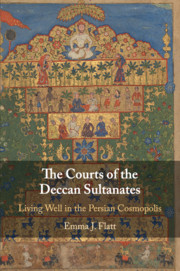
-
Select format
-
- Publisher:
- Cambridge University Press
- Publication date:
- July 2019
- July 2019
- ISBN:
- 9781108680530
- 9781108481939
- 9781108741644
- Dimensions:
- (228 x 152 mm)
- Weight & Pages:
- 0.69kg, 336 Pages
- Dimensions:
- (229 x 152 mm)
- Weight & Pages:
- 0.45kg, 340 Pages
You may already have access via personal or institutional login
Book description
In the late fifteenth and sixteenth centuries, courtliness was crucial to the political and cultural life of the Deccan. Divided between six states competing for territory, resources and skills, the medieval and early modern Deccan was a region of striking ethnic, linguistic and religious diversity. People used multifaceted trans-regional networks - mercantile, kinship, friendship and intellectual - to move across the Persian-speaking world and to find employment at the Deccan courts. This movement, Emma J. Flatt argues, was facilitated by the existence of a shared courtly disposition. Engagement in courtly skills such as letter-writing, perfume-making, astrological divination, performing magic, sword-fighting and wrestling thus became a route to both worldly success and ethical refinement. Using a diverse range of treatises, chronicles, poetry and letters, Flatt unpicks the ways this challenged networks of acceptable behaviour and knowledge in the Indo-Islamicate courtly world - and challenges the idea of perpetual hostility between Islam and Hinduism in Indian history.
Reviews
‘The Courts of the Deccan Sultanates shifts the spotlight from South Asian kingship and rulers to the courtly environments they inhabited. Challenging Orientalist stereotypes of Indo-Muslim courts as mired in luxury and decadence, the book examines the courts of the early modern Deccan on their own terms, showing how the syncretic sensibilities and skills they cultivated accommodated the wide range of peoples who served in them. A marvellous achievement and a convincing exploration in historical anthropology.'
Richard Eaton - University of Arizona
‘In this magisterial work, Emma J. Flatt skillfully opens up for us the ‘black box' of Persianate court culture. Always recognized as important but never before theorized or understood in any detail, the social networks and bodily practices of Persianate courtly culture now stand illuminated in all their fascinating complexity.'
Phillip B. Wagoner - Wesleyan University, Connecticut
Contents
Metrics
Full text views
Full text views help Loading metrics...
Loading metrics...
* Views captured on Cambridge Core between #date#. This data will be updated every 24 hours.
Usage data cannot currently be displayed.
Accessibility standard: Unknown
Why this information is here
This section outlines the accessibility features of this content - including support for screen readers, full keyboard navigation and high-contrast display options. This may not be relevant for you.
Accessibility Information
Accessibility compliance for the PDF of this book is currently unknown and may be updated in the future.


